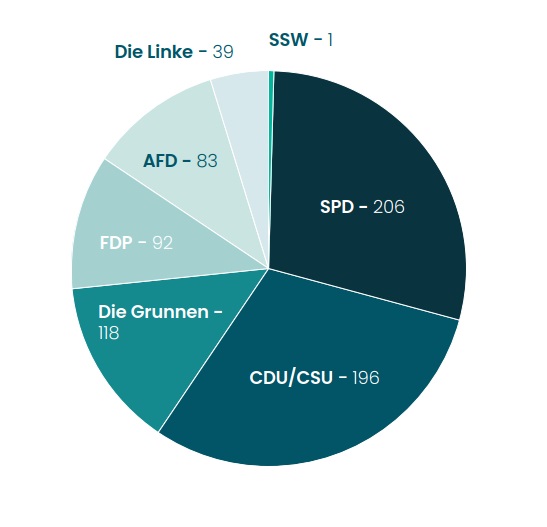
Germany held national elections at the end of September with big implications for cannabis in the European Union (EU). What happened and what does it mean for cannabis liberalization in Europe?
The Social Democratic Party (SPD) won the most seats displacing retiring Chancellor Angela Merkel’s Christian Democratic Union (CDU/CSU) as the biggest party in the German Bundestag (Parliament).
Under the German parliamentary system, if no political party wins a majority of seats in the Bundestag, they must work with other parties to form a coalition government that holds a majority of the seats. The parties negotiate with each other over who gets to run government ministries and the overall policy direction and goals their coalition would prioritize.
These coalitions can take weeks and months to form. Because the SPD received the most votes and allocated the most seats in the Bundestag, they have first chance to form a majority coalition.
The negotiations are currently underway. Most observers believe a ‘Stop Light’* coalition of the Social Democrat Party (SDP), the liberal Free Democratic Party (FDP), and the Green Party is the most likely to form a coalition government for Germany for the next five years.* The FDP and Greens received the 3rd and 4th highest number of seats in parliament, and such a coalition would give the new government a comfortable majority.
The FDP and Greens have explicitly come out in favor of legalization of cannabis, and the SDP has advocated in favor of allowing adult-use cannabis trials in German cities. Cannabis liberalization is one of the major issues both the FDP and Greens agree on, and when recently asked which policy would be easiest to implement with the Greens, Christian Lindner, the leader of the FDP, said “legalisation of cannabis.”
‘Stop Light Coalition’ arises from the fact that the parties’ traditional colors, respectively red, yellow, and green, resemble the normal color sequence of a traffic light.
The FDP and Greens have explicitly come out in favor of legalization of cannabis, and the SDP has advocated in favor of allowing adult-use cannabis trials in German cities. Cannabis liberalization is one of the major issues both the FDP and Greens agree on, and when recently asked which policy would be easiest to implement with the Greens, Christian Lindner, the leader of the FDP, said “legalisation of cannabis.” Rhetoric in a tight election is one thing, action in the new government is another. How likely is cannabis reform to occur?
“Germany will introduce cannabis reform, that’s for sure,” says lawyer, writer and German cannabis policy expert Kai-Friedrich Niermann. “The traffic light coalition talks about modernizing Germany, which certainly includes a new drug policy. In 2-3 weeks, we will know exactly what the new government has committed itself to.”
Niermann believes reform will happen in steps but is optimistic it will move forward quickly. “Full legalization is not expected overnight; first decriminalization will be decided. In the best case, decriminalization will be decided in the first 100 days. Then the debates and hearings on the Green Party’s cannabis control law will begin. Many individual points are still unclear — advertising, quality, and product safety regulations still need to be detailed. We estimate that this phase will take the entire year 2022 and the first half of 2023. The final draft legislation will then be adopted in the 2nd quarter of 2023 at the latest. The first cannabis store can open on New Year’s morning 2024.”
” The first cannabis store can open on New Year’s morning 2024.
Germany has the largest population and economy in the 27-country European Union. It also has an outsized influence on the domestic policy of EU member countries. If Germany creates an adult recreational cannabis market, the pressure to reform cannabis laws in the European Union and the domestic parliaments of the 27 member states would grow immensely.
Steps toward reform throughout the European continent and the UK have been slow and steady over the past five years. The creation of a legal, regulated multi-billion dollar cannabis market would likely bring a tidal wave of reform across Europe.
“If Germany legalizes,” says Niermann, “Europe will follow in the short to medium term. This will create huge investment and growth opportunities. I advise all American companies and investors to look at the situation immediately and carefully.”

Marc Brandl
Research Analyst, Arcview Market Research
Marc Brandl is a research analyst for The Arcview Group. He has over 20 years of experience in the field of cannabis – first as a campaign manager and policy activist in Washington, DC for Marijuana Policy Project (MPP) and other advocacy groups, and in the past seven years working directly in the cannabis industry.
He can be reached at [email protected]
Editors’ Note: This is an excerpt from our Monthly Playbook. If you would like to read the full monthly playbook and join the thousands of others you can sign up below.


